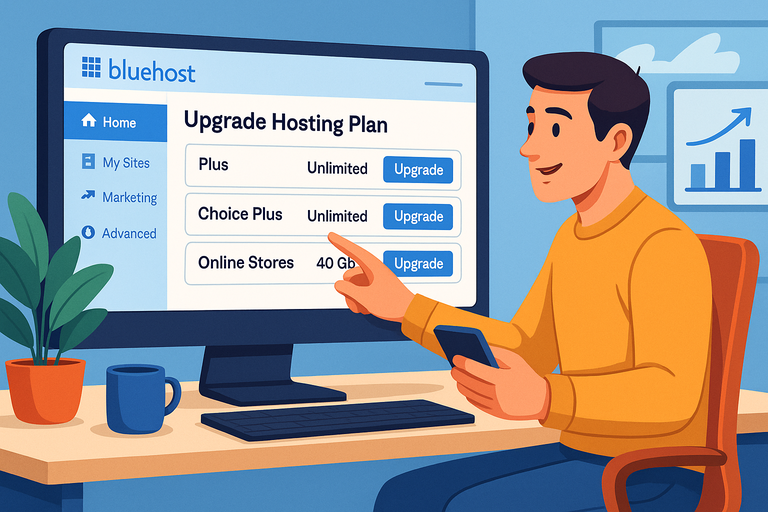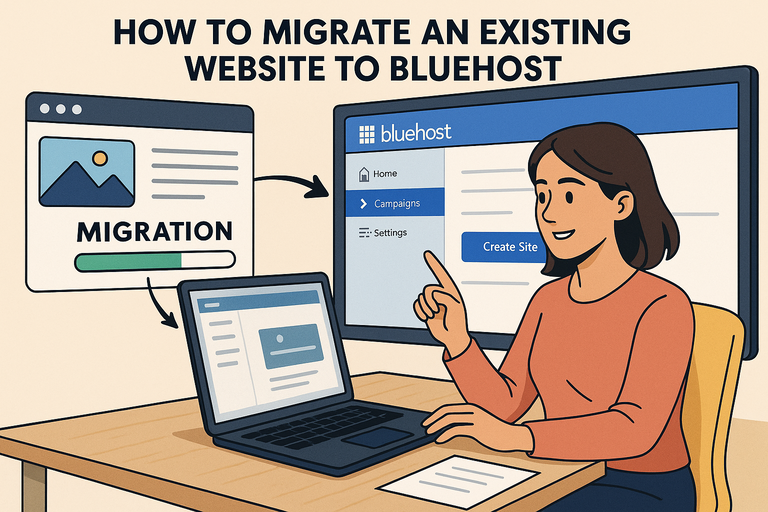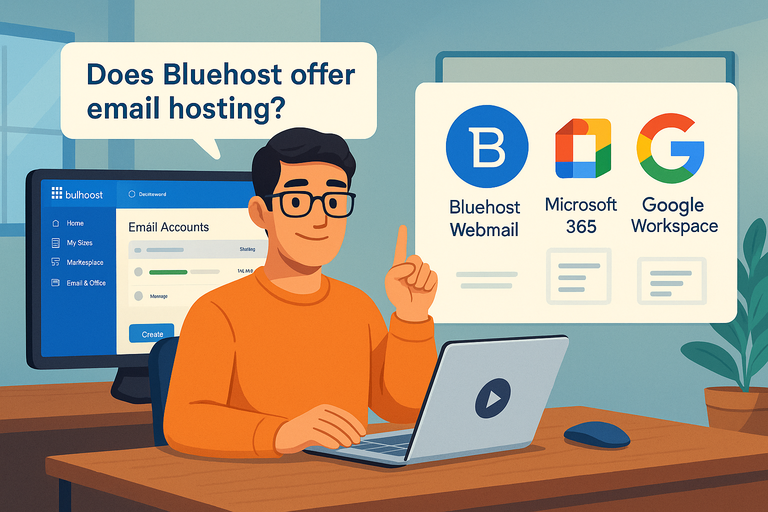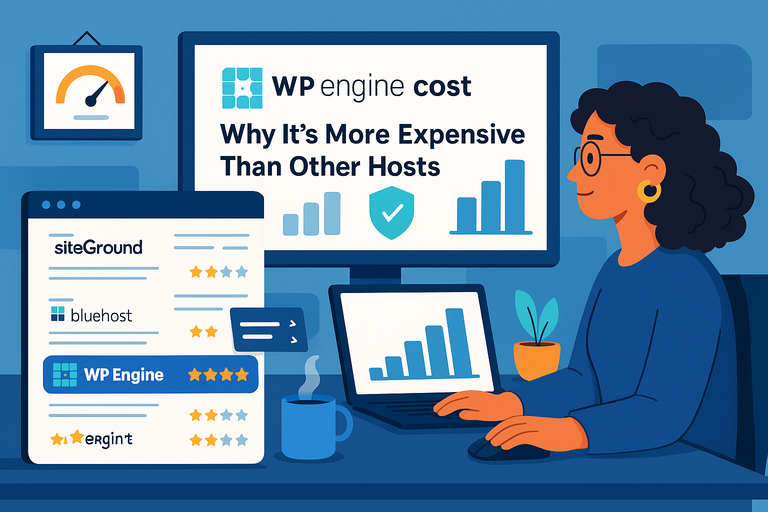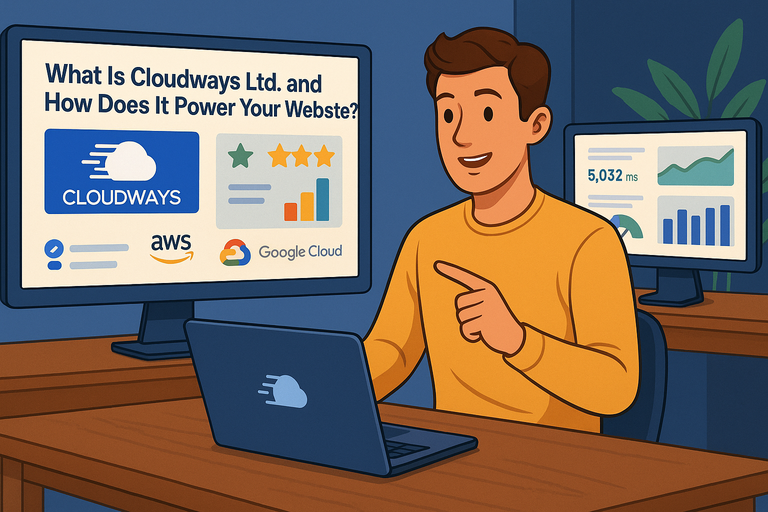Table of Contents
Some links on The Justifiable are affiliate links, meaning we may earn a small commission at no extra cost to you. Read full disclaimer.
HostGator pricing might look like a steal at first glance, but is it really as cheap as it seems? Those eye-catching low monthly rates often hide a maze of add-ons, upsells, and renewal surprises that can catch you off guard.
How much more could you end up paying once the first term ends? Which extra fees are worth keeping and which ones should you skip?
In this guide, we’ll break down every hidden cost so you know exactly what you’re signing up for before hitting that checkout button.
Understanding HostGator’s Base Pricing Structure
Before you fall for those big, bold discounts on the HostGator homepage, let’s get real about what “HostGator pricing” actually means. The sticker price is just the tip of the iceberg, and most people don’t see what’s lurking beneath until it’s too late.
If you’re looking to save money—and your sanity—here’s what you need to know about how HostGator actually structures their plans.
How HostGator Markets Its Introductory Rates vs. Renewal Rates
You know those “$2.99/mo” banners plastered everywhere? Here’s the catch: that rate is almost never what you’ll actually pay in the long run. HostGator loves to show you the lowest possible monthly price, but only if you pay for 36 months upfront. That’s a big commitment—like buying a three-year gym membership without a single workout.
After your initial term, those prices shoot up dramatically. For example, a Hatchling shared plan that starts at $2.99/month can renew at almost double or even triple the cost. I’ve seen people get blindsided by renewals because it wasn’t obvious this jump was coming.
My advice? Always read the fine print before entering your payment details. Those “special offers” are more like “special, and then suddenly not-so-special.”
Differences Between Shared, VPS, and Dedicated Plans in Cost
HostGator’s menu can look like a sushi bar—plenty of options, but what’s actually worth your money? The most common plans are:
- Shared hosting: The cheapest, aimed at beginners and small sites. Think of it like renting a bunk bed in a hostel—you get what you pay for, and privacy is minimal.
- VPS (Virtual Private Server): Mid-tier pricing, more control, and dedicated resources. This is for growing sites that want more muscle but don’t need a private island.
- Dedicated hosting: The top shelf. It’s expensive, powerful, and honestly overkill unless you’re running a high-traffic site or a business that can’t afford downtime.
Shared hosting prices start low, but when you jump to VPS or Dedicated, expect the monthly rates to spike—often five to ten times higher. The base price for a dedicated server can easily hit $80–$120/month (and that’s before add-ons).
HostGator’s pricing lures you in with bargain shared plans but gets steep fast as your needs grow. I always suggest mapping out your real needs before clicking “Buy Now.”
The Role of Long-Term Commitments in Lowering Monthly Prices
If you want the lowest HostGator pricing, you have to play their game: sign up for the longest term possible. The magic number? Thirty-six months. That’s three years. If you pick a shorter term—say, a single year—the monthly rate jumps noticeably.
There’s a trade-off. Locking in for three years can give you peace of mind and budget predictability, but it also ties you down to one provider. What if your needs change, or you find a better deal elsewhere next year?
Personally, I recommend weighing the risk. If you’re testing a project or unsure about your long-term needs, it might be worth paying a bit more for flexibility. But if you’re all-in, going long-term can save a lot—just don’t forget those renewal spikes waiting for you on the other side.
Renewal Rate Surprises You Should Expect
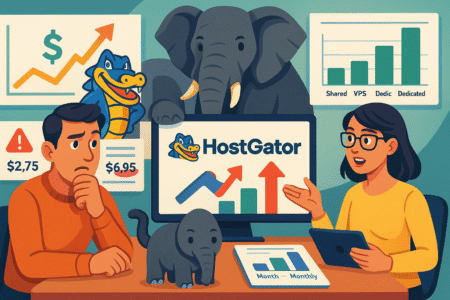
Let’s talk about the elephant in the server room: what happens when that shiny “intro offer” runs out. HostGator pricing can go from “nice” to “are you kidding me?” in a single invoice.
How Renewal Pricing Jumps After the First Term
Here’s the truth: HostGator’s renewal rates almost always catch people off guard. You might start at $2.99 a month, but after your first contract, you’ll often see your cost double or even triple—sometimes overnight. That Hatchling plan? It might jump to $10.99/month or more.
If you’re not paying attention, that extra $50–100 a year can sting, especially if you’re running multiple sites. HostGator isn’t alone here—most big-name hosts do the same thing—but it’s easy to forget about renewal rates if you sign up and set it on autopay.
My advice: Set a calendar reminder for a month before your renewal date. Use that time to shop around, negotiate, or decide if you want to stick with HostGator or make a switch.
Comparing Renewal Costs Across Different Plan Levels
Not all renewal shocks are created equal. Shared hosting plans have one tier of sticker shock, while VPS and Dedicated hosting can bring a whole new level of financial whiplash. Here’s a quick breakdown:
- Shared plans: Typically double at renewal, sometimes more if you chose a very short initial contract.
- VPS plans: These can increase by 30–50% after your first term, especially if you took advantage of an aggressive promo code.
- Dedicated servers: Highest renewal jumps—sometimes $30–$40 more per month. For business users, this can add up to hundreds per year.
If you’re managing several sites, or your business relies on web hosting, those increases pile up fast. I recommend always calculating your two-year and three-year costs (not just the first-term “deal”) before committing.
Why Month-to-Month Pricing Is Significantly Higher
Maybe you like the idea of paying monthly—no long-term contracts, no big upfront bill. HostGator does offer month-to-month, but here’s the catch: you’ll pay a much higher rate for the privilege. Sometimes double or triple the “best deal” price.
This might seem unfair, but it’s classic pricing psychology. Hosts want you locked in for as long as possible, so they penalize short-term users. If you need to test the waters, go monthly—but set a reminder, and don’t be surprised by the premium you’re paying for flexibility.
In the end, the real “deal” with HostGator pricing is only unlocked if you’re ready to commit, renew, and keep your eyes peeled for any surprise fees lurking in the fine print.
Domain Name Fees That Add Up Quickly
HostGator pricing doesn’t stop at hosting; the domain side is where a lot of people get tripped up. You know that “free domain” carrot they dangle? It’s a classic—gets you in the door, then you find out what’s waiting behind it.
Free Domain Offers and What Happens After Year One
If you’re new to HostGator, you probably saw the “free domain for a year” in big, cheerful letters. Here’s the truth: that freebie is a one-time thing. When renewal rolls around, your domain isn’t free anymore. Instead, you’ll pay the full annual price (typically $17–$20, sometimes even more if you add extras).
Here’s how it works in practice:
- Sign up for any eligible plan and pick your domain at checkout.
- Enjoy that first year, but as soon as you hit year two, HostGator charges you their standard rate.
- Miss the renewal window? The fee for getting your domain back can easily hit $80 or more, thanks to “redemption” charges.
I always set a reminder in my calendar for 11 months out—just to avoid surprises. If you’re someone who hops between hosts, know that transferring your “free” domain elsewhere often isn’t free at all. Some hosts, including HostGator, tack on extra fees for transferring domains out before the full term ends.
Privacy Protection and WHOIS Guard Fees
Here’s where HostGator pricing gets sneaky. Domain privacy (sometimes called WHOIS Guard) hides your personal info from public records. They’ll let you register a domain, but privacy protection is another $15–$20/year per domain. Some hosts toss this in for free—HostGator does not.
Why does this matter? Without privacy protection, anyone can look up your name, email, and address. Spammers, marketers, and sometimes sketchy competitors absolutely love this trick.
My honest take:
- If privacy matters to you, don’t skip it.
- Build the fee into your annual budget.
- If you manage several domains, this “small” cost stacks up fast.
Transfer and Redemption Fees You Might Overlook
Let’s get into the gritty details.
- Domain transfer out: Want to move your domain to another registrar? HostGator doesn’t block you, but you’ll need to pay for another full year at the new place, and any “unusual” extension may carry a hidden fee.
- Redemption fee: Accidentally let your domain expire? Getting it back can cost anywhere from $75–$150, depending on the domain extension. This is called the “redemption period,” and it’s a money-maker for all registrars, not just HostGator.
Pro tip: Set reminders and always keep your contact info updated. I’ve seen businesses lose domains because a renewal email landed in spam. The redemption fee is not negotiable—it’s built into global registry policies, and you can’t sweet-talk your way out of it.
Add-On Services That Increase Your Bill
Now, let’s talk about all those little checkboxes HostGator puts in your path during checkout. Most are unchecked—at first. But with a single click, your monthly price can double. I see this happen to beginners all the time.
Website Backup Services (CodeGuard) and Annual Costs
HostGator loves to upsell you on “CodeGuard” for automated backups. Do you need it?
- What it costs: About $2.99/month ($35.88/year) for the basic package, but that’s per site.
- What it does: Backs up your files and databases daily, lets you restore with a click.
Here’s where I step in with a big asterisk: If you’re running a small site, you might be okay using free manual backups (download from cPanel) or your own cloud solution (think Google Drive or Dropbox). But if you want peace of mind, or you run an online store, CodeGuard isn’t a bad idea—just remember to include the cost in your math.
If you skip it now, you can always add it later from your dashboard. But the “save X%” they pitch at signup is a classic nudge—buy it now or pay a bit more later.
Email Hosting Upgrades and Storage Limitations
Here’s another spot where HostGator pricing can creep up.
- The base shared plans include email, but storage is limited, and advanced spam filtering or higher storage means upgrades.
- Want business-class email (think Microsoft 365 or Google Workspace)? You’ll need to connect a third-party solution and pay extra.
I’ve set up dozens of sites where the “included” email wasn’t reliable for business (slow, often flagged as spam).
My advice: If you’re serious about your email reputation, skip the HostGator add-on and go straight to a dedicated provider. You’ll get better uptime, deliverability, and support—yes, it’s a few bucks more a month, but you’ll thank yourself later.
Premium SSL Certificates Beyond the Free Option
Yes, HostGator gives you a free SSL (the “https” padlock) for basic security. But if you want advanced SSL (for ecommerce, or multiple subdomains), here’s what happens:
- The free Let’s Encrypt SSL is fine for most blogs and small business sites.
- If you want wildcard SSL or an extended validation (EV) certificate, be ready to shell out anywhere from $50 to $150 a year—sometimes more.
- You’ll see offers for “SiteLock” security and bundled SSL in your checkout, but read the details. Many users end up paying for an SSL upgrade when the free one was already enough.
Real scenario: I once helped a small shop migrate to HostGator and got pitched on a $120/year SSL add-on. They never needed it. For 99% of sites, the free SSL is just fine. The key? Don’t buy what you don’t need. If your business grows and you need advanced SSL, you can upgrade later—no rush, no FOMO.
Hidden Costs in Website Security
Staying secure with HostGator is a bit like buying a new car and being sold floor mats, tire insurance, and a mysterious anti-theft device. Some add-ons are just marketing muscle, while others can save you from real trouble.
Here’s how to spot which is which—so you pay for real protection, not just peace of mind.
SiteLock Security Plans and Pricing Tiers
SiteLock is HostGator’s preferred security sidekick. It’s pitched right at checkout and, let’s be honest, the upsell is strong. I’ve seen three main options: basic monitoring, malware scans, and a more advanced “Fix” package that promises to actively remove threats.
Here’s what actually happens:
- The cheapest plan does a once-daily scan and tells you if you have a problem. That’s it.
- For real cleaning or guaranteed malware removal, you’ll need a pricier plan—sometimes $40–$60 per year, per site.
- The most advanced package includes a site “badge” (a digital sticker, basically) for “customer trust.” Not exactly high-tech defense.
Here’s my advice: If you’re running a standard blog or small business site, the basics might suffice, especially if you keep plugins and themes updated.
But if you handle customer data, consider going up a tier—just make sure you know what you’re getting. Some SiteLock features duplicate what you can do with a good security plugin (like Wordfence or Sucuri) for less money.
Malware Removal Fees and Emergency Cleanups
Picture this: you wake up to find your site hacked or flagged as “unsafe.” The panic is real, and so is the sticker shock when you realize HostGator charges extra for emergency cleanup.
What you need to know:
- Unless you’re on a premium SiteLock plan, HostGator’s default support doesn’t include hands-on malware removal.
- Emergency cleanups often come with a one-time fee—sometimes $100+—and you’re at the mercy of their support queue.
- You’re encouraged to upgrade your security plan after the fact, which is a little like being sold a fire extinguisher after the fire’s already started.
What do I suggest?
- Set up automated backups (either with HostGator’s add-ons or your own plugin).
- Install a reputable WordPress security plugin for daily scans and firewall protection.
- Don’t assume the base plan has your back if things go sideways—budget for what actually matters, not just the digital sticker.
How Optional vs. Mandatory Security Costs Are Positioned
HostGator walks a fine line between offering security as a choice and making you feel like it’s not really optional. You’ll see security add-ons pre-selected at checkout. You can uncheck them—but not without a little guilt trip.
Here’s the behind-the-scenes play:
- Security add-ons are “optional,” but persistent popups and warning banners suggest you’re foolish to skip them.
- Some features (like free SSL) are truly included, but malware removal, advanced firewalls, and daily scans all cost extra.
- If your site is hacked and you haven’t paid for security up front, you’ll end up paying more—either in time, lost sales, or emergency support fees.
In practice: I recommend reviewing each checkbox and asking: “Will I actually use this? Is there a cheaper or better alternative?” Don’t let FOMO (fear of missing out) drive your security decisions—real protection matters, but not every HostGator add-on delivers what you need.
Extra Charges for Website Performance
Let’s move from safety to speed—because nobody wants a slow, sluggish site, and HostGator knows it. Here’s how the extras stack up when you want your website to load like lightning (or at least keep up with the competition).
CDN Services and Speed Optimization Add-Ons
HostGator will sell you performance boosts in the form of a CDN (Content Delivery Network) and optimization services. Sounds impressive, but what are you actually getting?
- Basic plans don’t include a global CDN—unless you add it (often via Cloudflare integration or paid upgrade).
- Their “speed optimization” package sometimes bundles caching, minification, and CDN for an extra $10–$15 per month.
Is it worth it?
- If your visitors are worldwide, a CDN is helpful. But you can connect free Cloudflare directly, often with better control and no extra cost.
- Their optimization bundle may not do more than a good free WordPress caching plugin (like WP Rocket or Litespeed Cache).
From my own experience: I suggest testing your site speed with and without HostGator’s add-ons. Often, a few smart tweaks on your own (image compression, lightweight themes, smart plugins) beat any paid bundle. Don’t pay for “set and forget” speed boosts without checking if they move the needle.
Priority Support or “SEO Tools” Packages
The next tier of add-ons promises “priority support” or built-in SEO tools—usually as monthly or annual upsells.
Here’s the deal:
- Priority support may jump you ahead in the ticket queue, but I’ve rarely seen it save more than a few hours in real emergencies.
- HostGator’s SEO tools are basic: keyword suggestions, XML sitemap generation, and some on-page tips.
- For real SEO results, free (or better) tools like Rank Math, AIOSEO, or Surfer SEO plug right into WordPress and do more for less.
Pro tip: If you’re running a business site with regular issues, priority support could be worth a look—but for most, the standard support is fine, if you’re patient.
Resource Upgrade Fees for Traffic Spikes
If your site suddenly takes off (viral post, big promo, featured on Reddit), HostGator may hit you with “resource upgrade” notices. Your site might slow down or get throttled if you exceed CPU, RAM, or bandwidth limits.
Here’s how it plays out:
- HostGator often recommends upgrading to a higher plan (or VPS) for more resources.
- In some cases, you’ll be billed extra or nudged to a premium “Business” plan on the spot.
What should you do?
- Monitor your traffic in cPanel, and don’t ignore warning emails.
- If you’re expecting a spike (big campaign, media mention), reach out to support in advance—sometimes they’ll offer short-term solutions without a full upgrade.
- Consider whether it’s cheaper to upgrade permanently or ride out the surge and downgrade after.
Bottom line: HostGator pricing isn’t just about the monthly hosting sticker. It’s about reading the fine print, spotting the upsells, and understanding what’s truly optional.
I believe most people can save real money with a little research, a dash of skepticism, and a healthy side-eye for every “recommended” add-on. If you want a custom checklist for which extras are worth it and which to skip, just let me know—happy to share my real-world blueprint.
Early Cancellation and Refund Clauses
Most people glance at the “money-back guarantee” and assume all is fair game. But HostGator’s refund policies are a bit more tangled than their marketing suggests. If you’re not careful, those promised savings might evaporate before your eyes.
How the 45-Day Money-Back Guarantee Really Works
HostGator promotes a 45-day money-back guarantee on most hosting plans—a longer window than the industry average. It sounds generous, but here’s what’s really happening:
- The guarantee covers hosting only, not domains, setup fees, or most add-ons.
- If you cancel within 45 days, you must request your refund manually (don’t expect it to appear on your card automatically).
- The process often involves emailing support, verifying your identity, and waiting a few days for review.
From experience: I’ve helped clients get their refunds, but you need to act fast and stay organized. Screenshot your signup date, keep your invoices handy, and submit your request in writing—don’t rely solely on live chat for important issues like money back.
A quick answer for skimmers:
- Only hosting fees are refundable within 45 days.
- Domains, SSL, and privacy are not covered.
- You must request a refund; it’s not automatic.
Pro-Rated Refunds for Mid-Term Cancellations
What if you cancel after the 45 days? This is where HostGator pricing can get stingy:
- HostGator does not offer pro-rated refunds after the 45-day window. Once you’re past it, any unused time is forfeited.
- If you’ve prepaid for three years and cancel after six months, you eat the remaining two and a half years. That’s tough if your plans change.
I always suggest choosing a shorter billing term (yearly, not three years) if you’re not 100% sure you’ll stick with HostGator. It’s an insurance policy against their “no refund after 45 days” rule.
Non-Refundable Fees You Might Miss in the Terms
Now for the fine print, the part few people read:
- Domain registration and transfer fees are never refunded—even if you cancel your hosting.
- Premium add-ons (like SiteLock, CodeGuard, premium SSL, and search engine submission) are non-refundable.
- If you received a free domain at signup, HostGator will deduct the regular registration cost from your refund. So your “free” domain just became a line-item deduction.
Practical example: A reader once paid for hosting and several add-ons, canceled in week three, and was surprised their refund was just a fraction of what they paid. Always double-check what’s truly covered before you buy.
Upsell Triggers During Checkout
HostGator’s checkout is less “one and done,” more “choose your own adventure”—but every wrong turn costs you. Here’s how they nudge you to spend more than you intended.
Pre-Checked Add-Ons That Increase the Initial Price
The checkout screen is a minefield of extra services—most are conveniently pre-checked for you:
- SiteLock Security, CodeGuard backups, SEO tools, and professional email are usually toggled on by default.
- If you’re moving quickly, it’s easy to breeze past and agree to $50–$100 in annual extras without realizing it.
I always advise: slow down and review each line item. Only pay for what you truly need (and you’ll rarely need every single “recommended” service).
Here’s a quick checklist for checkout:
- Uncheck anything you didn’t come for.
- Click “More Info” beside each add-on to see if it’s really necessary.
- Make sure your total matches the base plan you expected.
How to Spot and Remove Extra Charges Before Payment
HostGator’s checkout tries to hide a few upsells in plain sight. Watch out for:
- Upgrades like “Business Plan” or “Priority Support” that bump up your total.
- Sneaky checkboxes buried in fine print (read every page before hitting “Buy Now”).
- “One-time offer” popups before the final payment screen.
My best tip: Use your browser’s “Find” function (Ctrl+F or Cmd+F) to search for “fee,” “add-on,” or “extra” on the checkout page. You’d be surprised how many costs appear only in the final summary.
The Psychological Pricing Tactics HostGator Uses
HostGator’s pricing team knows every trick in the book:
- Anchoring: Showing the most expensive plan first, so the “cheaper” ones seem like a deal.
- Decoy pricing: Making mid-tier plans look like the smartest buy, even if you don’t need the extras.
- Countdown timers and “limited-time offers” to push you toward faster, less thoughtful decisions.
The antidote? Take your time, ignore fake urgency, and calculate your total cost for the first three years—not just the flashy intro rate.
Strategies to Minimize or Avoid Extra Fees
Okay, let’s talk tactics. Here’s how I keep my own HostGator bill in check—and how you can do the same, even if you’re just starting out.
Negotiating Renewal Discounts With Support
Here’s something most people don’t know: you can negotiate! When your renewal is up, reach out to HostGator support and ask for a better rate.
- Be polite but firm: explain that the renewal price is much higher than what you paid before.
- Mention you’re considering leaving unless they can offer a discount.
- Ask if there are any current promotions for existing customers.
In my experience: Support often has “retention” coupons they can apply. It won’t always match your original price, but it can save you 10–25% off the renewal.
Using Third-Party Services for Domains and Email
HostGator loves to be your one-stop shop—but you don’t have to buy everything there.
- Domains: Register your domain with Namecheap or GoDaddy. You’ll get cheaper renewals and free privacy protection.
- Email: Use Mailerlite or Zoho for business email. It’s more reliable, offers better support, and you won’t lose your address if you switch web hosts later.
I always keep my domain and hosting separate. It makes moving to a new host far less painful if you ever want to jump ship.
Setting Calendar Reminders for Renewals and Cancellations
The simplest, most underrated tactic:
- Put your hosting, domain, and add-on renewal dates in your digital calendar.
- Set reminders 30, 7, and 1 day before expiration.
Why? You’ll have time to shop around, negotiate, or cancel before any surprise charges hit your card. I’ve seen too many people lose a domain or get billed for another year just because they missed an email.
Summary checklist:
- Always read the fine print before buying.
- Remove all pre-checked add-ons at checkout.
- Negotiate your renewal.
- Keep domains and email separate.
- Use calendar reminders to avoid nasty surprises.
Conclusion: Outsmarting HostGator Pricing—The Power’s In Your Hands
If you’ve made it this far, you’re already way ahead of the average HostGator user. Most people see a shiny low price, rush through checkout, and only realize the true cost when renewal time or an “unexpected” fee lands in their inbox.
You? You’re now armed with all the knowledge HostGator would probably prefer you didn’t have.
Here’s what I hope you’ll take away:
HostGator pricing isn’t evil—but it is complicated, and the system is designed to catch the unprepared. When you know how to spot the traps, skip the unnecessary add-ons, and push for a better deal, you can still score reliable hosting without overspending or feeling taken for a ride.
Remember, you don’t have to buy every upsell. You can negotiate, you can split services between providers, and you absolutely can set reminders to stay one step ahead of renewal jumps or lost domains.
If something in the process feels off or too good to be true, trust your instincts and double-check. Most of all, know that every extra dollar you keep in your pocket is a small but real victory for independent creators like us.
I’m Juxhin, the voice behind The Justifiable.
I’ve spent 6+ years building blogs, managing affiliate campaigns, and testing the messy world of online business. Here, I cut the fluff and share the strategies that actually move the needle — so you can build income that’s sustainable, not speculative.


